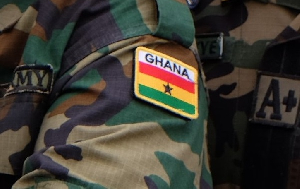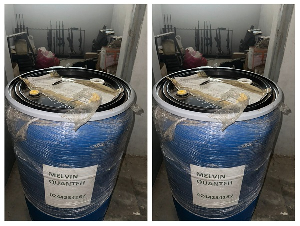 Mr Daniel Owusu-Koranteng and his executive address the media
Mr Daniel Owusu-Koranteng and his executive address the media
The Maritime and Dockworkers’ Union (MDU) of the Ghana Trades Union Congress (TUC) are seething with anger over impending takeover of Reefer Container business from GPHA by Meridian Port Services, MPS.
The move by MPS, according to reports, stems from security lapses which has allegedly led to massive loss of Reefer Containers at the terminal.
Nonetheless, MDU have argued that the takeover will have dire consequences on its members and are thus calling for immediate termination of takeover process.
Mr Owusu-Koranteng added that by that arrangement, MPS had become the beneficiary of revenues accruing from the reefer container business, which they described as a bonus on to top of the generous incentives provided in the concession agreement.
Touching on the ongoing negotiation of the concession, he reminded government that MPS terminal three project was a good project with a bad agreement noting that it would result in the loss of substantial revenues of GPHA as there would be reduction of stevedoring, shore handling works, port dues, terminal area fee among others.
Read full Statement:
STATEMENT DELIVERED BY DANIEL OWUSU-KORANTENG, GENERAL SECRETARY OF THE MARITIME AND DOCKWORKERS’ UNION AT THE PRESS CONFERENCE ORGANISED BY MDU IN COLLABORATION WITH TUC (GHANA) ON THE NEGOTIATIONS FOR THE REVIEW OF THE MERIDIAN PORT SERVICES (MPS) CONCESSION AGREEMENT ON 7TH OCTOBER,2019
National Chairman of MDU,
The Deputy Secretary General of TUC
General Secretaries of Affiliate Unions of TUC
Members of the National Leadership of MDU
Workers of Ghana Ports and Harbours Authority
Members of MDU
Our friends from the Media
Ladies and Gentlemen
We have invited you to brief you on the negotiations for the review of the MPS Terminal 3 Concession agreement.
It would be helpful to provide some background information in relation to the flawed contract procurement process, the content of the agreement, the proposals of the Ministerial Committee for the review of the MPS Concession agreement and other relevant information.
The Meridian Port Services (MPS) is building a new container terminal (Terminal 3) in the Tema Port under a concession agreement that has attracted public interest and discontent.
The Ghana Trade and Investment Gateway Programme (GHATIG) was launched by the government of Ghana to help achieve the objective of making Ghana the Gateway in the sub-region. The government identified Ghana Ports and Harbours Authority (GPHA) as one of the frontline institutions of the Gateway project and it was necessary to make the ports competitive in both infrastructure and service delivery.
The construction of Container Terminals by GPHA in the Tema Port has been part of the Master Plan of GPHA for Port Infrastructural development to develop the Tema Port into a Container hub for the sub region.
Under the Administration of President Kuffour , GPHA inaugurated a 60 million euro modern container terminal (Terminal 2) at the Tema Harbour on Thursday, October 20 , 2005 to transform the Tema Port into a main transhipment port of the West African sub-region for the creation of jobs and generation of revenues to boost the national economy. The construction of Container Terminal 2 in the Tema Port has been key in increasing container cargo traffic of Tema Port beyond 1,000,000 TEUS in 2018.
FLAWED PROCUREMENT PROCESS
Following the increasing volumes of container cargo throughput at the Tema Port and in line with the Government of Ghana’s Trade and Development Gateway Project, GPHA initiated the procurement process for the expansion of the Tema Port for the development of a new Terminal to accommodate bigger vessels.
According to the Ministerial report on the MPS Concession Agreement, in 2012, GPHA initiated a procurement process to expand the Tema Port into deeper waters in accordance with the Tema Port Master Plan, through international competitive public tender. The international competitive process which was initially transparent shortlisted 20 out of the 56 applicants of which 16 companies submitted entries as at May 2014. The Ministerial Committee’s report indicated that whilst the procurement processes were underway, the Meridian Port Holding (MPH) /MPS did not participate in the competitive processes but the previous political administration acting through the Ministry of Transport issued a directive to GPHA to terminate the procurement process and open discussions and negotiation with MPS. The Ministerial Committee report stated that;
‘’ The directive requested GPHA to open discussions and negotiation with MPS for the Port of Tema Expansion Project. The Committee did not come across any written evidence of the above-referenced directive, but officials of GPHA indicated that it was through telephone conversation.’’
It is established that organising international tendering process in a public-private arrangement in a container terminal concessioning will produce value for money and avoid suspicion that are associated with direct negotiation with a single project sponsor. The international competitive tendering is a preferred option to the single project sponsor because it is a standard that is used to assess whether the procurement process meets international best practice in the development of a container terminal for a port.
The shift from the international competitive bidding process to the direct negotiation with a single project sponsor as happened in the case of the Terminal 3 concession process, has created a lot of questions, suspicion, anxiety and agitations.
The International Finance Corporation (IFC) of the World Bank that claims to uphold the principle of transparency, competition and adequate stakeholder engagement in projects with negative effects on other operators, has undermined its own values by investing in a project which cannot pass the test of international competitive bidding and transparency.
MPS TERMINAL 3 PROJECT- A GOOD PROJECT WITH A BAD AGREEMENT
The concession agreement of the MPS Terminal 3 in Tema Port is a good project with a very bad agreement.
The Deed of Amendment (DoA) provides that during the Term, the Concessionaire shall have the exclusive right to provide services to any eligible vessel entering the operational area where the eligible vessel is defined as any vessel which is a Full Container Vessel or a Vessel which is carrying two hundred (200) Twenty Foot Equivalent Units(TEUs) entering the Operational Area.
The Exclusive right given to MPS to handle vessels carrying two hundred or more containers virtually grants an exclusive right for MPS to handle almost all containerised cargo in Tema Port. In an era where container vessels have increased their capacities to carry 10,000 TEUS and beyond, few vessels would call at the Tema Port with container cargo less than 200 TEUS. According to GPHA, in 2018 , only eight ( 8) full container vessels called at the Tema Port with 200 TEUs or less.
The exclusivity clause is an anti-competition clause, which is meant to promote monopoly in the maritime industry as well as undermine the legal status of GPHA as the Landlord of the Tema Port with the legal right to set rates in the port.
Experts in the maritime industry have expressed the opinion that although competition restriction provisions are generally not advisable, one of the conditions where limited exclusivity may be considered include ports with very low container traffic of about 100,000 TEUS per annum. The Tema Port recorded container cargo throughput of more than 1,000,000 TEUs in 2018 . It is our opinion that, considering the container traffic records of Tema Port , MPS project does not need the exclusivity clause, tax waivers and other generous incentives to operate a profitable container Terminal . The construction of Terminal 3 was a good opportunity for the promotion of competition between Container Terminal 2 operated by GPHA and Container Terminal 3 operated by MPS in Tema Port. The MPS would have still gained the advantage of attracting bigger vessels to Terminal 3 because of its deep-water berths for bigger vessels.
The concession agreement of MPS Terminal 3 would result in the loss of substantial revenues of GPHA and GPHA has identified revenue losses in the following sections of their operations:
Containers that GPHA will handle in its receipt and delivery ( shore handling) operations will reduce by at least 60%.
Containers transferred from MPS to GPHA facilities will reduce to 32% of current volumes.
Volume of containers handled by GPHA ( Stevedoring) will decline from 92,539 TEUs to 30% of current volumes.
Revenues from Stevedore companies will reduce by over 60%
GPHA’s shore handling revenue from Terminal 1 and Golden Jubilee Terminal (GJT) is estimated to decline by 53%.
Port Dues , a major source of revenue for GPHA will decline by 90%.
No Terminal area fee (rent) shall be earned by GPHA on the new terminal. MPS paid US$ 826, 156.83 as Terminal Area Fees on Terminal 2 in 2017. Terminal Area Fee for Terminal 3 is estimated at US$1.60 million per annum. This will be lost to GPHA.
GPHA earned over US$ 3million from Berth Occupancy Revenue from Container operations in 2017 . This revenue line will be lost completely in spite of the expected larger vessels in Terminal 3 .
Revenue from containers stevedored by GPHA will be shared 80% for GPHA and 20% for MPS This 20% would have been equivalent to US$ 843,374.26 of the Stevedore revenues to be earned by GPHA in 2017.
GPHA’s Royalty revenue from MPS stevedoring operations will decline by 80%.
According to GPHA’s analysis , the cumulative immediate impact of the above revenue losses is estimated to total US474 million per annum to GPHA (2017 data) . This amount represents 40% of GPHA’s operating revenue.
GPHA had constructed a Reefer Terminal with a capacity of 800 TEUS equipped with two generators with generating power capacity of 1.2MVA . The Reefer Terminal generates substantial revenues to GPHA in the form of electricity charges, rent, ICD handling charges , Handling charges , transfer charges among others .
Through unproven allegations that Reefer containers get missing from the Reefer Terminal of GPHA , the Ghana Revenue Authority has put up measures which had placed the handling of Reefer Containers in the hands of MPS in Terminal 3 thus denying GPHA of huge revenues though Reefer Containers are not covered by the concession agreement. Today, the GPHA Reefer Terminal has become a graveyard with virtually no activity. By this arrangement, MPS has become the beneficiary of revenues accruing from the Reefer Container business, which is a huge bonus on top of the generous incentives provided in the concession agreement.
We call on government to find a solution to the takeover of the Reefer Container business from GPHA under the cloak of loss of Reefer Containers as a matter of urgency. If there are genuine security lapses at the GPHA Reefer Container Terminal in spite of the heavy presence of the security personnel and other paramilitary officers, we must fix them and not use any excuse to deny GPHA/Government the revenues from their investment in the Reefer Container Terminal. The directive of Ghana Revenue Authority ( GRA) on Reefer Container Business amounts to throwing away the baby with the bathwater.
With all the generous incentives, the Terminal 3 project benefitted from a tax waiver of $ 836 million when the project cost was $ 1.5 billion. The tax waiver remained at the same level even when the project cost has been revalued at $ 1.1billion.
UNION’S EXPECTATION
The Ministerial Committee set up by the government recommended that the government use all available technical, legal and political means to call for a thorough renegotiation of some aspects of the agreements governing the GPHA-MPH-MPS relationship. The report recommended further that ‘’the agreements should be substantially re-negotiated with clear and consistent definitions of terms, roles, rights, responsibilities etc of the parties.’’
On the 13th of May 2019 the MDU and union leaders of GPHA had a meeting with H.E. Nana Addo-Dankwa Akufo Addo at the Jubilee House on the MPS Concession agreement. The President promised to adopt a tripartite approach for the review of the MPS agreement. A statement issued by the Minister of Transport on 28th June 2019 stated inter alia, ‘’ The President further held a meeting with the shareholders of MPS, and obtained their commitment to ensure adequate revenue generation and job retention on the part of GPHA.’’
We commend H.E. Nana Addo-Dankwa Akufo Addo for setting up a Ministerial Committee to investigate MPS Terminal 3 concession agreement. The report of the Ministerial Committee has exposed the extent of the huge revenue losses and the resultant job losses associated with the implementation of the Terminal 3 concession agreement. The challenge however, lies in how we can correct the possible damage that the Terminal 3 concession agreement would cause to the Blue Economy of our country. The Ministerial report raised the important question of the period of the concession agreement. It is not clear whether the concession agreement is for 15 years or 35 years. We are also not clear about when to start counting the contract period of the agreement.
The Ghana Ports and Harbours Authority has sacrificed many of the demands it had presented at the beginning of the negotiations in exchange for a modest demand to work on 20% of the Eligible Vessels. According to GPHA, when the demand of 20% of Eligible Vessels is granted, the Authority would be able to have enough revenues to keep its workers and avoid job losses but MPS maintains that if it grants GPHA the right to work on 20% of Eligible Vessels, it would amount to losing its Investment Protection. MPS has made a proposal, which includes finding jobs for some of the workers who would lose their jobs as well as paying those who cannot be employed immediately for three years and retraining them with the hope of making them employable in the future.
We participated in the negotiations of MPS concession agreement with the expectation of ensuring adequate revenue generation and job retention for GPHA but MPS has turned the negotiations for the review of the Terminal 3 Concession agreement into a forum for the protection of the investment agreement even if that would weaken GPHA’s revenue generation capacity which would lead to massive job losses for GPHA workers and other companies such as ACS, TCT etc.
In our view, the proposals of MPS are only palliatives which would not be able to address the important issue of revenue generation for GPHA , job creation and the problem of job losses. Such a proposal will convert GPHA from a Landlord status to a vulnerable entity that has to survive on dole outs from its tenant-MPS. The negative effects of the operations of MPS Terminal 3 on job losses permeates the entire maritime industry. Some maritime companies have expressed their intentions to lay many workers off because of the effects of the operations of MPS on GPHA’s container handling business.
Currently, GPHA is providing employment opportunities for hundreds of thousands of permanent workers, national service personnel, contract staff etc . We expect government to support GPHA to create jobs for our people and generate revenues for government. This is in contrast with the low employment generation by MPS and the repatriation of profits by the multinationals to their home countries.
After five ( 5) meetings of the negotiation team , the MPH group has maintained its position of proffering palliative solutions to the problem of revenue generation and job losses with the reason that they would lose their investment protection if they accept the proposals of GPHA. The irony is that whilst GPHA as a Landlord needs the 20% of Eligible Vessels to survive, MPS wants to maintain its investment and profit levels gained from a flawed procurement process.
We are of the strong opinion that GPHA should have held on to its proposals presented for the negotiations in order to achieve substantial review of the bad MPS Concession Agreement. However, we are compelled to support the position of GPHA in its modest request to work on 20% of the Eligible Vessels. Our support to GPHA is because we recognise that GPHA being a party to the concession agreement stands at a better position to define what is in the best interest of the Authority in this difficult situation.
In all the discussions in the negotiations, MPS has hanged on the argument of having gained the concession agreement through a legal process, which informs their strong position not to grant the modest request of GPHA. It is important to remind the MPH group that having a Legal licence for the project is as important and necessary as having a Social Licence, which would ensure that the company operates on triple bottom line of balancing its Profit maximisation interest with the interest of the people and businesses in the maritime community and the Planet (Environment). It would also ensure that the company operates in an atmosphere of peace and above all, MPS would gain the support of all stakeholders in the maritime industry for their operations.
There is a stalemate on the way forward for the negotiations on the concession agreement in terms of the demand of GPHA and the position of MPH, which had necessitated the scaling up of the discussions to the level of the Board of Directors and Annual General Meeting of MPS.
We expect the shareholders of MPH to grant the modest demand of GPHA to handle 20% of the Eligible Vessels in the interest of peace and harmonious relationship. We believe that such a modest demand of GPHA would not collapse the MPS project but GPHA may not be able to survive the financial trauma of the negative effects of the project if the shareholders of MPH do not make concessions in the negotiations that will ensure the financial viability of GPHA for job creation, increased revenue generation and the protection of existing jobs.
We expect the shareholders of MPS to take decisions that would make GPHA and other port operators financially strong with the operations of the Terminal 3 and not weaken GPHA financially. GPHA is a state agency that has been a reference point of excellence and we owe it a duty to ensure its continuous improvement in providing economic, social and financial benefits to our nation. As a Landlord and a Regulator, GPHA should continue to operate as an independent financially viable entity and not a weak organisation that survives on dole outs from tenants.
Ghana has messed up many economic opportunities especially the extractive Sector and we must not add the Blue Economy to our lost opportunities.
We thank the media for attending this Press Conference at short notice and we want to thank GPHA workers and all the MDU members who are present at this Press Conference to solidarise with us. We are grateful to the Trade Union Congress, Ghana for the support and solidarity and we hope to count on the TUC family for the continued solidarity.
LET THE OWNER BEWARE AND ACT.












